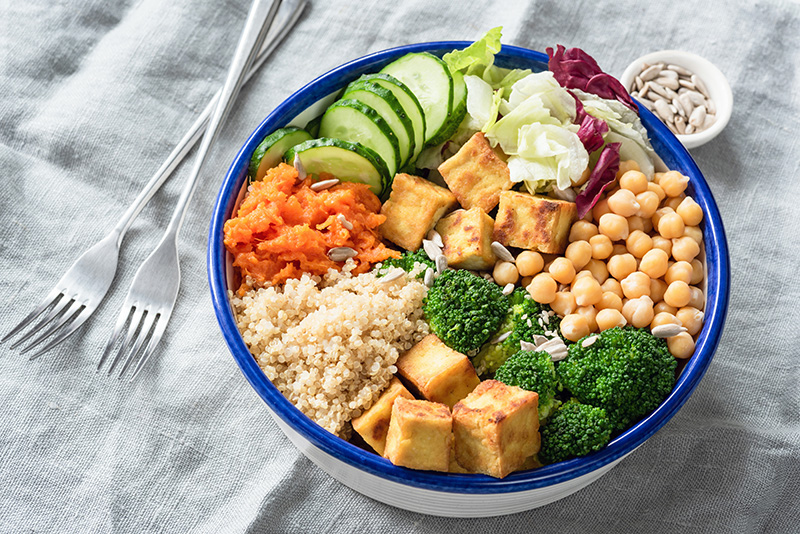More Health and Nutrition Bites
Related
More on small dietary changes
Today's Health and Nutrition Bite is an interesting, larger-scale application of the outcomes of several different avenues of research into portion size, calorie density, and overall food consumption.
Evidence for 5 a day
Your mother probably told you to eat your vegetables. And she was right. The question many people have, however, is "Just how much?" In the 1990's the USA had the 5-a-day campaign, which was softened to "Fruit and Veggies - More Matters" in 2007, although the 2015-2020 guidelines for Americans suggests 2 1/2 servings of vegetables and 2 servings of fruit per day.
It's easier than you think to improve metabolic scores
In medicine, it's almost axiomatic that for those who are overweight or obese, losing weight will improve metabolic scores such as blood pressures, cholesterol scores, and glucose or insulin scores. This weight loss is usually effected by cutting overall calories, regardless of whether the diet plan is Mediterranean-style, ketogenic, Paleo, or DASH diet.
Health & Nutrition Bites
Get the latest health and diet news - along with what you can do about it - sent to your Inbox once a week. Get Dr. Gourmet's Health and Nutrition Bites sent to you via email. Sign up now!
Quality counts

We have been saying for almost two decades that it's the quality of the calories you consume that counts. No, a calorie is not a calorie is not a calorie.
Now, we have very interesting research in the form of a randomized controlled trial that this is not just true for overall dietary quality, but it also means losing more weight when consuming higher quality ingredients (Am J Clin Nutr 2022;116:132-150).
A team of researchers in the Netherlands recruited an initial group of 110 people between the ages of 40 and 70 to participate in a dietary intervention. To participate in the study, participants had to have a Body Mass Index of at least 27 or have a waist circumference of >88cm (for women) or >102cm (for men). They could not have been diagnosed with diabetes or another chronic condition, be vegetarians or allergic to fish, or be on medications known to affect cholesterol or glucose scores.
The participants were randomly assigned to one of three groups. The first was the control group, who continued to follow their usual diet and exercise regime (if any). The second group (known as the High Quality Diet Group) worked with dietitians to reduce their caloric intake by 25% while also consuming more brown rice and whole grain pasta, land animal protein only 3 times per week and fish twice per week, snacking on fruit and reduced-fat cheeses, and taking a fish oil supplement daily.
The third group, known as the Low Quality Diet Group, also cut their caloric intake by 25% but consumed white rice and white flour pasta, more fruit juices, and yogurt or custard as well as fruits as snacks. Otherwise both groups who cut calories consumed substantially similar daily meals that were nutritionally sound.
At the start and end of the study the authors drew blood from all participants to perform blood tests and also measured the participants' body fat distribution and total fat mass using MRI.
Compared to those in the Low Quality Diet Group, those in the High Quality Diet Group consumed more soy protein, fiber, monounsaturated fatty acids, and omega-3 fatty acids while also consuming less fructose. Remember that both groups were consuming 25% fewer calories than they required in order to induce weight loss.
Those in the High Quality Diet Group lost between 5.2 and 11.6 kilograms in the 12 weeks of the study. That's between about 11.5 pounds and 25.6 pounds.
Those in the Low Quality Diet Group lost between 2.4 and 10.2 kilograms, or about 5.3 to 22.5 pounds.
In the High Quality Diet Group, 85% of the participants lost over 5% of their body weight and 38% lost over 10% of their body weight, while in the Low Quality Diet Group 75% of participants lost more than 5% of their body weight and just 21% lost more than 10% of their body weight.
Both diets helped participants reduce their abdominal fat and improve their blood pressures, while the High Quality Diet Group also saw greater improvement in their cholesterol scores.
What this means for you
Bearing in mind that this is a small study, the surprise bonus here is that improving the quality of what you eat when cutting calories may lead to greater weight loss. What's more important is that the quality of the calories you consume has greater impact on your health than the number of calories you consume.
July 26, 2022
